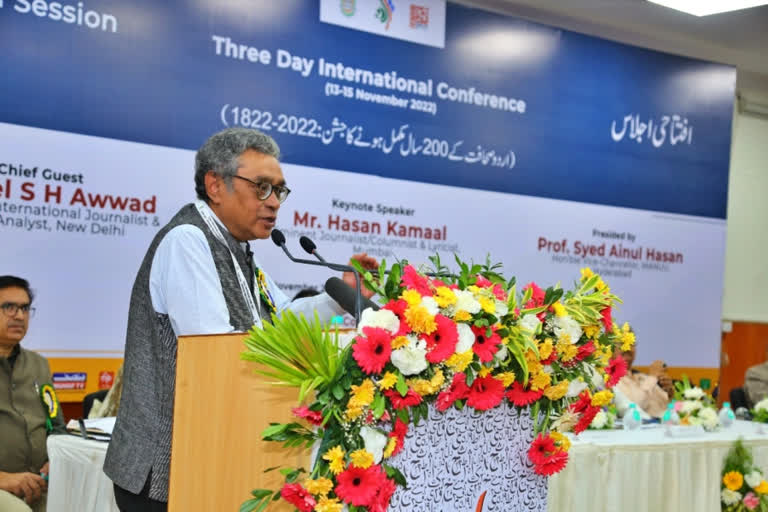Language is the medium through which news travel, and when language is connected to or analysed through the lens of a specific religion, it limits information flow and substantially undermines the veracity of the content. There are thousands of languages in the world which are used to share information.
It is the information which is supreme and language has to be a vehicle. And, if the vehicle is painted red, green or saffron, the very credibility of the information gets marred. The impact of the content depends critically on how reliable the information is. And it is credibility that guarantees reach and a wide possible audience.
On Sunday, representatives from all around the country gathered in various auditoriums of Maulana Azad National Urdu University in Hyderabad to discuss how Urdu journalism which completes its 200 years shouldn't be seen through the prism of a religion. The participants, who were primarily from non-Urdu backgrounds, talked about how journalism in Urdu is similar to journalism in other languages.
They truly sought to convey that Urdu is a language that belongs to everyone and is not only a language for Muslims. They substantiated it with historical evidence, citing the fact that a Hindu from Kolkata, the capital of British India at the time, started the country's first Urdu newspaper. Later, the same person launched newspapers in Hindi and Persian from Kolkata.
Delegates were expected to speak on various topics that would serve as the basis for debates. Most of the themes dealt with the future, challenges, and financial viability of Urdu journalism. The importance of Urdu text in the context of its commercial viability was discussed by Swapan Dasgupta, a former BJP member of parliament and one of the delegates at the Urdu media summit. As an argument that script is important or not, Swapan said, "the influence of the language is far bigger than text."
The delegates who had come from various cities, mostly from Delhi, were eminent journalists, writers, academics, with backgrounds in languages other than Urdu. Sanjay Kapoor, Sreenivasan Jain, Satish Jacob, Rahul Dev, Pankaj Pachuri, Sumera Khan, Rahul Srivastava, and Anand Vijay were among the prominent media figures that travelled to Hyderabad to debate the 200-year history of Urdu journalism and to share their thoughts and ideas. Because Urdu is commemorating its 200-year journey, MAANU and their partners created various theme-based programmes where journalists spoke about them.
The audience included journalism students and other members of the community. On the evening of the inaugural ceremony, Sreenivasan Jain of NDTV tore apart one of the themes on how the media may promote peace and dialogue. He asserted that while media cannot promote peace, and they are not meant for because they are there to communicate the truth, no matter how unpleasant it may be. The guests in the university lawns, who were mainly students, applauded Jain's comment, stoked the excitement.
A Hindi journalist's hot take blaming the media's irresponsibility for the inadequate coverage of Ukrainian women derailed the entire conversation. The show's host Sumera Khan of TV 9 Bharatvarsh jumped in and said that she had personally produced various stories on Ukrainian women and children. Pankaj Pachuri, another host, trying to douse the fire, brilliantly attributed a couplet "dag chahre main hai aur ayena saf karne ki koshish hai"— means that the blemish is on the face and that the mirror is to fault. In the end, the issue of whether the media should act as promoter of peace or simply a news maker remained unresolved.
Because there was disagreement over the fundamentals of journalism, the audience left the lawns perplexed. The dispute blurred the fault lines between how a communication professional should behave if they want to work in the development sector and how a communication student should act if they decide to pursue journalism as a career.
While writing a document for an NGO, for example, promoting peace and supporting nonviolence can be an agenda. However, journalism is a game of attribution and represents the ground reality because it reflects the truth as it exists, no matter how ugly that fact may be. Journalists are to be impartial, and that is how they can practise their career choice with integrity while 'Development Journalists' associated with NGOs are at liberty to follow agendas like peace, love, or anything.



